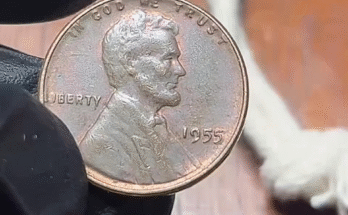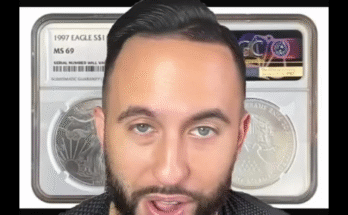
Did you know that a single 1944 penny could make you a millionaire? 🤑 Most 1944 Lincoln cents are common copper coins, but a handful were struck with rare errors that now sell for hundreds of thousands — even up to $1,000,000 at auction.
Here’s your complete guide to spotting the rarest 1944 penny errors and their current value in 2024.
🔎 Top 3 Valuable 1944 Penny Errors
1️⃣ The “Holy Grail” – 1944 Steel Cent
- Value: Up to $1,000,000+
- Why so rare? During WWII, leftover 1943 steel planchets were accidentally used in 1944.
- How to identify:
✅ Magnet Test: Real steel cents stick to a magnet.
✅ Color: Silver-gray (not the usual copper).
✅ Weight: 2.7g (vs. 3.11g for copper). - Rarity: Only 30–40 known across all U.S. mints.
- Auction history: Graded examples have sold for $300,000 – $1,000,000+.
2️⃣ Lamination Error (Peeling Surface)
- Value: $50 – $500
- What it looks like: A flaky, peeling, or missing layer of metal on the surface.
- Cause: Impurities in the copper alloy.
- Collector tip: Mint State (uncirculated) examples can sell for 20–50% more.
3️⃣ Die Break / “Cud” Error
- Value: $100 – $5,000
- What to look for: Raised metal “blobs” on Lincoln’s cheek, jaw, or rim.
- Why valuable? Collectors love dramatic breaks, sometimes paying 10× standard prices.
📊 2024 Value Guide for 1944 Pennies
| Error Type | Circulated Value | Mint State Value |
|---|---|---|
| 1944 Steel Cent | $75,000+ | $300K – $1M+ |
| Lamination Error | $50 – $200 | $300 – $500 |
| Die Break / Cud | $100 – $400 | $500 – $5,000 |
✅ How to Authenticate Your 1944 Penny
For Steel Cents:
- 🧲 Must stick to a magnet.
- ⚖️ Correct weight: 2.7g.
- 📜 Submit for grading at PCGS or NGC (a $150 fee is worth it).
For Lamination & Die Breaks:
- 🔬 Use a microscope — look for natural metal flow, not tool marks.
- 🔍 Compare with documented varieties like the “Cheek Cud.”
🚫 Red Flags (Fakes to Avoid)
- Painted or plated copper cents to mimic steel.
- Wrong mint mark style for 1944.



Leave a Reply